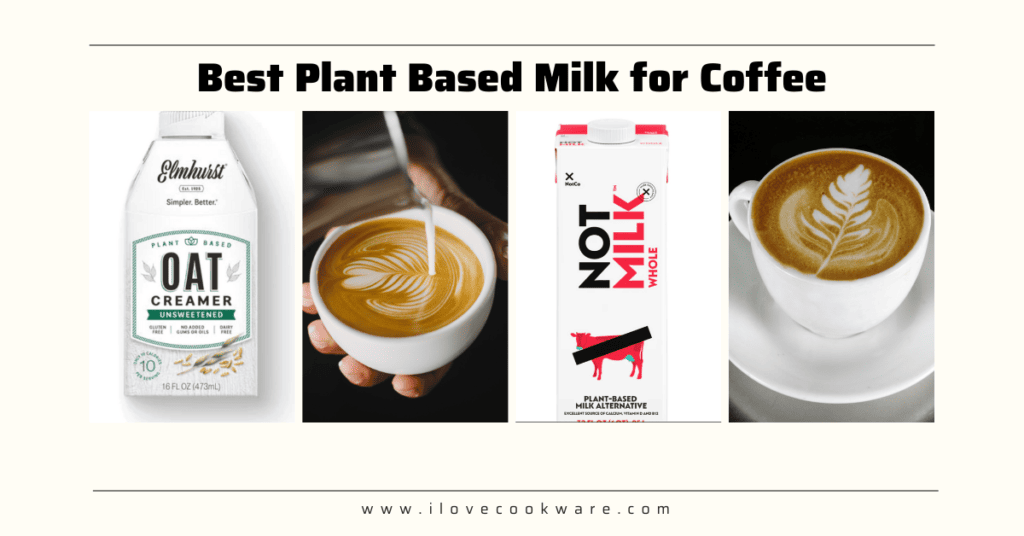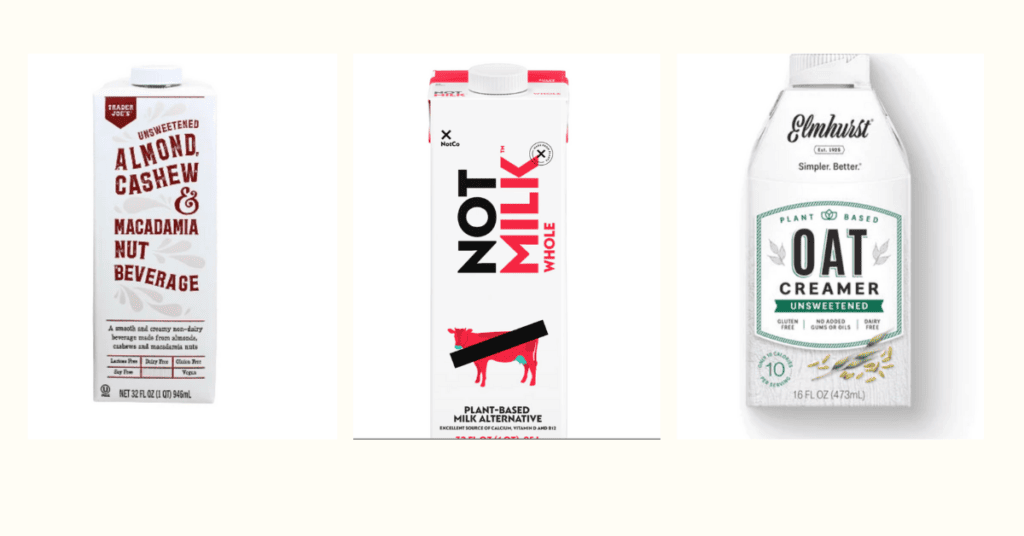A good choice for the best plant based milk for coffee depends on your preference. Plus, your tolerance for the milk to separate plays a factor in which is the best. While I think almond milk tastes the best, if you don’t choose a “barista almond milk blend,” you’ll likely have it separate from the coffee.
Check out some dairy-free milk ideas if you’re a coffee drinker and don’t want your caffeine black.
Best Plant-Based Milk for Coffee Drinkers

Choosing the right plant-based milk for coffee is crucial for achieving the perfect balance of taste and texture. Specific types of plant milk are crafted to replicate the creaminess of dairy milk and perform exceptionally well under the steam wand for lattes and cappuccinos.
These non-dairy milk options will guide you in picking out the best options. However it ultimately comes down to personal preference.
Barista Blend Plant Based Milk
The specially formulate barista blends to achieve a silky texture and stable foam when steamed, making them a favorite among coffee enthusiasts for their ability to create artful latte designs. They fortify these with calcium and vitamin D and are designed not to separate when combined with coffee.
Almond Milk
Among various plant-based milk options, almond milk is often cited for having a relatively neutral taste, especially in unsweetened and unflavored varieties. It’s mild and slightly sweet, making it a versatile choice for sweet and savory dishes without overpowering other flavors.
So, if you are also looking for a good substitute for milk in cereal, this is a great option. The nutty flavor actually complements the cereal!
Oat Milk
Oat milk is known for its naturally mild sweetness and creamy consistency, making it an excellent coffee companion.
Rich in fiber and vitamins, oat milk provides a subtle taste that complements the bold flavors of espresso and is perfect for creating foam due to its rich, creamy texture. One of our favorites is the Elmhurst unsweetened oat creamer!

Soy Milk
Soy milk is a classic choice. It is high in protein and has a nutritional profile similar to dairy milk. It provides a neutral flavor that doesn’t overpower coffee and contains essential fatty acids, vitamins, and minerals. They fortify many soy milk options, providing additional health benefits.
Pea Protein Milk
“Not Milk” is a brand that falls under the category of plant-based milk alternatives, and it distinguishes itself by using pea protein as one of its primary ingredients. The brand aims to replicate the taste, texture, and nutritional profile of cow’s milk without the use of any animal products.
Not Milk combines pea protein with other plant-based ingredients, which may include a blend of oils, sugars, and vitamins, to create a milk alternative that is versatile for various uses, such as drinking, cooking, and baking. The use of pea protein not only provides a source of protein but also makes it suitable for people with nut or soy allergies, offering a lactose-free, vegan-friendly option for those looking for dairy milk alternatives.
Coconut Milk
Coconut milk adds a tropical hint and lightweight creaminess to coffee. With a lower protein content but a distinct flavor profile, it’s a suitable option for those who enjoy a hint of coconut and are looking for a milk alternative with healthy fats.
Nut Blend Milk from Trader Joe’s
Trader Joe’s nut blend milk combines a variety of nuts to create a rich flavor with nutritional benefits. It often contains vitamins and minerals like calcium and vitamin D, providing a unique and satisfying taste when mixed with coffee.
You can also use this as a milk substitute for mashed potatoes; it’s awesome!
Cashew Milk
Cashew milk is less common but valued for its creamy texture and sweet flavor. It typically contains less fat than other nut milk and can add a subtle nutty undertone to coffee, making it a delightful addition to a morning brew.
Hemp Milk
Hemp milk offers a slightly earthy, nutty flavor and is a good source of omega-3 fatty acids, which are beneficial for heart health. Hemp milk also froths well for a non-dairy option, lending itself to a creamy coffee experience.
Macadamia Nut Milk
Macadamia nut milk is a luxurious choice with a rich buttery flavor. It’s high in healthy fats, making a satisfying creamy coffee drink. You can use macadamia milk to add a smooth and indulgent dimension to a simple cup of coffee.
Rice Milk
Rice milk is the least allergenic of plant milk and has a naturally sweet taste. While it’s thinner in consistency, rice milk can be a light alternative for those preferring a less creamy coffee or for individuals with multiple food sensitivities.
Understanding Plant-Based Milk
Plant-based milk offers diverse nutritional profiles and flavors. It addresses health and environmental considerations while adding variety to dietary choices.
Nutritional Profile of Popular Plant-Based Milks
Soybean is the best milk alternative with a high protein content.
| Type | Protein (g) | Calcium | Vitamin D | Vitamin B12 | Fiber | Omega-3s |
|---|---|---|---|---|---|---|
| Almond Milk | Low | Fortified | Fortified | Often Added | Minimal | Some |
| Soy Milk | High | Fortified | Fortified | Often Added | Some | Rich |
| Coconut Milk | Low | Minimal | Fortified | Rarely Added | Minimal | Some |
| Cashew Milk | Low | Fortified | Fortified | Occasionally Added | Minimal | Some |
| Oat Milk | Moderate | Fortified | Fortified | Occasionally Added | High | Minimal |
Almond and soy milk are high in vitamins and often fortified with calcium and vitamin D. Fiber is more prominent in oat milk, while cashew and coconut milk are lower in protein.
Health Benefits and Considerations for the Best Plant Based Milk for Coffee.
Plant-based milk can support heart health with lower cholesterol levels and saturated fats than dairy milk. Soy milk has a good protein content and essential fatty acids that benefit metabolism.
Most plant-based kinds of milk are lactose-free, accommodating those with lactose intolerance.
Environmental Impact
Plant-based milk generally has a lower carbon footprint than dairy milk. Almond milk, for instance, uses less water than dairy but requires more water than other plant milks. Eco-friendly packaging and organic practices enhance their sustainable credentials.
Flavor Profiles
| Type | Flavor | Sweetness Level | Notes |
|---|---|---|---|
| Almond Milk | Nutty, mild | Low | Natural sweetness, often flavored with vanilla |
| Soy Milk | Creamy, full-bodied | Moderate | Less sweet, versatile for coffee |
| Coconut Milk | Tropical, rich | Moderate | Natural sweetness, good in creamy lattes |
| Cashew Milk | Creamy, sweet | Moderate | Sweet and smooth, works well in coffee |
| Oat Milk | High | Naturally sweet | Enhances the flavor of coffee |
Flavors range from nutty and tropical to smooth and creamy, with natural and added sweetness varying by brand and type.
Culinary Uses
Plant-based milks are versatile and suitable for coffee, baking, cooking, and especially cereal. They can also replace dairy milk in smoothies, sauces, and dessert recipes. For best results, the flavor profile should match the culinary application.
Consistency and Texture
Non-dairy milks vary in consistency from the watery hint of almond milk to the thicker, creamier texture of oat milk. Some are formulated to foam well for coffee beverages like lattes and cappuccinos.
Sweetness Level
Unsweetened varieties provide no added sugar, while sweetened versions can contain varying levels of natural or artificial sweeteners. Consumers can choose based on dietary preferences or specific uses, like coffee or baking.
Dairy Milk Comparisons
Compared to cow’s milk, plant-based milks usually have lower protein and fat content, except for soy milk, which is closer in protein. They are typically cholesterol-free and can be fortified to match dairy milk’s vitamin and mineral levels.
When you choose one of the barista blends they add some fat content so it blends well with the coffee.
Characteristics of Non-Dairy Creamers
Non-dairy creamers, often found in the non-dairy aisle, may include plant-based milk enhanced for creaminess and froth. They often contain thickeners and emulsifiers to improve texture and stability in hot beverages.
Nuts and Seeds Varieties
Beyond the well-known almond, soy, and cashew milk, there are hemp, macadamia, and hazelnut milk. These types offer diverse tastes, health benefits from omega-3 fatty acids, and culinary uses, such as in creamy sauces or rich coffees.
Choosing the Best Plant-Based Milk for Coffee
When adding plant-based milk to coffee, it’s essential to consider how it froths, its flavor compatibility, nutritional content, and its ability to mix well without curdling.
Frothing and Texture for Coffee Drinks
For a creamy froth suitable for lattes and latte art, oat milk is often preferred for its stability and smooth texture. Soy milk is also favorable as it creates a thick foam that holds well, closely mimicking dairy milk.
Flavor Pairing with Coffee
Almond milk’s taste profile, with its natural sweetness and slightly nutty flavor, pairs well with coffee’s bitterness. Unsweetened soy and cashew milk can complement coffee without overpowering it, while coconut milk adds a tropical twist.
Nutritional Additions to Coffee
Many plant-based milks are fortified with calcium, vitamin D, and omega-3 fatty acids, enhancing the nutritional value of your coffee. Choose soy or almond milk for added protein and fiber, which benefits heart health.
Compatibility with Different Coffee Types
Almond and soy milk are versatile for different coffee types, from espressos to Americanos. Oat milk’s neutral flavor and coconut milk’s richness are best suited for drinks with less intense coffee, such as lattes and cappuccinos.
Sweetened vs Unsweetened Milk in Coffee
Opt for unsweetened milk alternatives for a pure coffee flavor, depending on your coffee sweetness preference. Alternatively, go for sweetened versions if you prefer a hint of sweetness without adding sugar.
Preventing Separation and Curdling
To prevent curdling in coffee, use plant milks like Ripple (pea protein milk), known for its stability at high temperatures. Warm the milk before adding it to the coffee to match the temperatures and reduce the risk of separation. IMHO, Ripple by itself or in cereal is gross; the flavor is off, but for cooking, it’s okay.
Also use barista blends, they have a mix of fats in the milk that help it not separate from the coffee.
Avoiding Allergens in Coffee Beverages
Oat, soy, or coconut milk are safe for those with nut allergies. Always check labels for cross-contamination warnings to ensure the milk alternatives are allergen-free.
Additional Considerations for Coffee Enthusiasts Who Want Plant Based Milk
When selecting the perfect plant-based milk for coffee, enthusiasts should know the nuances that can affect their coffee experience. These considerations include everything from barista preferences to market trends.
Barista Preferences (Top Coffee Shop Plant-Based Milks)
Many baristas prefer specific types of plant milk when crafting lattes and other coffee drinks. Oat milk is a top choice due to its creamy texture and ability to froth, which is essential for latte art. Almond milk is also popular, though its ability to froth could be more consistent.
Price and Availability
The cost and accessibility of plant-based milk can vary. Traditional soy and almond milk options are typically more affordable and widely available. In contrast, newer alternatives like pea milk might be pricier and less prevalent in the non-dairy aisle.
Innovative Plant-Based Milk Options
The market for plant milk is continuously expanding, with innovative options such as hemp milk and cashew milk entering the scene. These kinds of milk offer unique flavors and nutritional profiles but may only be suitable for some coffee types due to their varying frothing capabilities.
Adapting Home Coffee Routines
For those adapting their coffee routine at home, it’s essential to experiment with different plant milks to find the one that best suits their preferences for texture and taste. Unsweetened varieties are often preferred to control the sweetness level in coffee.
Dietary Integration and Balance
Integrating plant-based milk into a diet requires considering both taste and nutrition. Vegan milk can be fortified with vitamins and minerals to offer a balanced alternative to dairy. Individuals may choose organic or sweetened versions based on dietary restrictions and nutritional goals.
Labels and Certifications
Consumers should read labels carefully. Organic, vegan, and non-GMO certifications ensure plant-based milk meets specific standards. Labels also provide information about sweetened and unsweetened varieties, which is crucial for those monitoring sugar intake.
Trends in Plant-Based Milk Consumption
Trends in plant-based milk consumption show a steady rise, reflecting a growing interest in vegan and environmentally friendly products. As popularity grows, plant milk options like oat and coconut milk become staples alongside traditional non-dairy milk in coffee culture.
Exploring Lesser-Known Plant-Based Milks
While almond and soy milk have become commonplace, many lesser-known plant-based milks offer diverse flavors and nutritional benefits.
Regional Varieties
Rice and hazelnut milk are two regional options with roots in regional traditions and modern culinary exploration. Rice milk, often found in Asian cuisine, is celebrated for its naturally sweet taste and light consistency, making it a subtle complement to coffee. Hazelnut milk, with its rich and distinct flavor, hails from Europe and adds a nutty essence to coffee without overpowering it.
Homemade vs. Commercial Options
- Homemade plant milk: DIY macadamia milk provides a creamy texture and subtle taste, enhancing coffee’s flavor profile.
- Pros: Full control over ingredients, no additives, and can be organic.
- Cons: Time-consuming, shorter shelf-life.
- Commercial plant milk: Offer convenience and various fortified options such as omega-3 fatty acids and additional fiber.
- Pros: Longer shelf life, consistent quality.
- Cons: It may contain additives, which are typically more expensive.
Culinary Innovations in Plant Milks
Innovative vegan milks, such as part milk (a blend of plant milks), are gaining traction for their unique culinary applications. These blends can often withstand high temperatures, making them suitable for cooking and baking while maintaining a flavorful and creamy consistency ideal for coffee.
Nutritionally Fortified Alternatives
Plant milks can be fortified with various nutrients, enhancing their nutritional profile. For instance:
- Calcium: Essential for bone health, often added to fortified plant milk.
- Vitamins B12 and D, commonly found in fortified versions, support overall health.
- Fiber and Omega-3 Fatty Acids: Found in enriched options, they provide cardiovascular benefits.
Opting for fortified milk alternatives can contribute to dietary requirements, making them a healthful addition to coffee.
Frequently Asked Questions About Choosing Plant-Based Milk for Coffee
What is the most popular milk alternative for a rich and creamy latte?
Oat milk is incredible for creating a rich and creamy lathe. Thanks to its full-bodied texture and slight sweetness, it enhances the coffee experience without overpowering the espresso. If you asked this same question 15 years ago, the best option would be soy or rice milk!
Which plant-based milk option is best when using a milk frother for coffee?
Soy milk is often recommended for frothing. It creates a stable, silky foam similar to cow’s milk, perfect for lattes and cappuccinos. Another popular option is oat milk or any barista blend at any supermarket!
Which milk substitute is best for those looking to lose weight while enjoying coffee?
Almond milk is a preferred choice for calorie-conscious individuals. It is low in calories and has a subtle taste that complements coffee without adding weight.
Can you recommend the best almond milk that pairs well with coffee?
Barista editions of almond milk designed explicitly for coffee, such as Califia Farms or Almond Breeze Barista Blend, are formulated to pair beautifully with coffee, allowing for a balanced and harmonious flavor. We think they are the best plant based milk for coffee.
What soy milk variant gives coffee a taste closest to regular milk?
Unsweetened, organic soy milk typically provides the closest flavor profile to regular milk in coffee. Brands like Silk and WestSoy offer options that integrate well with coffee without altering its natural taste.
Aside from milk, what are the top plant-based alternatives for a comforting cup of coffee?
Oat, almond, or soy milk are top contenders for a comforting coffee cup. They provide a creamy texture and a hint of their distinctive tastes to the beverage. You’ll want to get the barista blend of any of these options.

